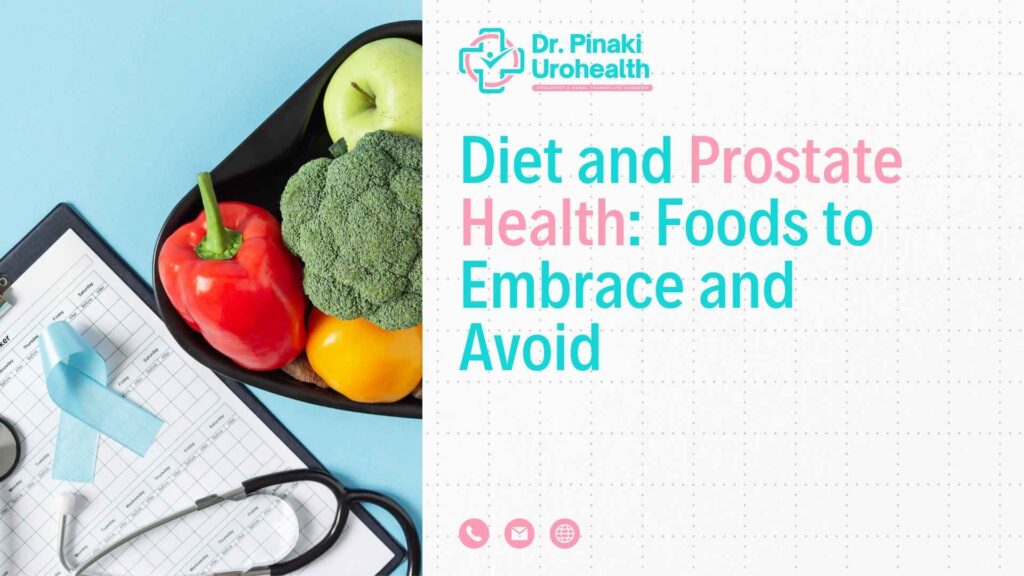As a Urologist, I’ve seen firsthand the significant impact that dietary choices can have on prostate health. While many factors contribute to prostate issues, a balanced diet can play a crucial role in prevention and management. In India, with its rich and diverse culinary heritage, understanding the connection between diet and prostate health is particularly important.
In this blog post, we’ll delve into the science behind diet and prostate health, exploring the specific foods that can bolster your prostate’s well-being and those that may increase your risk.
The Role of Diet in Prostate Health
The Science Behind It
To truly understand the impact of diet on prostate health, we must delve into the underlying science. Inflammation is a key factor in many prostate problems. A diet rich in antioxidants can help combat inflammation, protecting your prostate from damage.
Antioxidants are substances that neutralize harmful free radicals, which can damage cells. By consuming a diet rich in antioxidant-rich foods, you can help reduce oxidative stress and promote prostate health.
The Indian Perspective
India’s diverse culinary heritage offers a wealth of options to support prostate health. Traditional Indian cuisine, rich in spices like turmeric and ginger, has long been recognized for its medicinal properties. These spices are potent anti-inflammatory agents, making them valuable allies in the fight against prostate issues.
However, it’s important to note that while traditional Indian diets can be beneficial, modern dietary trends, such as increased consumption of processed foods and red meat, may pose risks.
Foods to Embrace
Lycopene-Rich Foods
Lycopene, a powerful antioxidant, has been linked to a reduced risk of prostate cancer. The best way to increase your lycopene intake is by consuming a variety of colorful fruits and vegetables. Tomatoes, watermelon, guava, and papaya are excellent sources of lycopene. Cooking tomatoes can actually increase their lycopene content, making them even more beneficial.
Nuts
Nuts are a nutritional powerhouse, packed with healthy fats, fiber, and antioxidants. Walnuts, in particular, have been shown to have a positive impact on prostate health. The omega-3 fatty acids and antioxidants in walnuts help reduce inflammation and protect prostate cells.
Fatty Fish
Fatty fish, such as salmon, mackerel, and sardines, are rich in omega-3 fatty acids. These essential fats have been linked to a reduced risk of prostate cancer and other prostate problems. If you’re not a fan of fish, consider incorporating flaxseeds or chia seeds into your diet, as they are also good sources of omega-3 fatty acids.
Foods to Avoid or Limit
Dairy Products
While dairy products are a good source of calcium and protein, some studies suggest that excessive dairy consumption may be linked to an increased risk of prostate cancer. It’s important to maintain a balanced intake and consider alternative sources of calcium, such as leafy green vegetables and fortified plant-based milk.
Red and Processed Meat
Consuming large amounts of red and processed meat has been associated with an increased risk of prostate cancer. If you do choose to eat meat, opt for lean cuts and limit your intake. Consider incorporating more plant-based proteins into your diet, such as beans, lentils, tofu, and tempeh.
Conclusion
By incorporating these dietary tips into your lifestyle, you can take proactive steps to support your prostate health. Remember, a balanced diet is key to overall well-being, including prostate health.
While diet plays a significant role, it’s essential to consult with a healthcare provider for personalized advice. Regular check-ups and early detection are crucial in managing prostate health.
Schedule a consultation with me today to discuss your specific needs and create a personalized plan for optimal prostate health.
Let’s make informed dietary choices to empower ourselves and lead healthier lives.
Frequently Asked Questions (FAQs)
Q: What is the role of lycopene in prostate health?
A: Lycopene, a powerful antioxidant, has been shown to reduce the risk of prostate cancer. It’s particularly abundant in tomatoes, watermelon, and guava. Cooking tomatoes can actually increase their lycopene content, making them even more beneficial.
Q: Are nuts good for prostate health?
A: Yes, nuts, especially walnuts, are excellent for prostate health. They are packed with omega-3 fatty acids and antioxidants, which help reduce inflammation and protect prostate cells.
Q: How does fatty fish benefit prostate health?
A: Fatty fish, such as salmon, mackerel, and sardines, are rich in omega-3 fatty acids. These essential fats have been linked to a reduced risk of prostate cancer and other prostate problems.
Q: Is dairy consumption harmful to prostate health?
A: While dairy products are a good source of calcium and protein, some studies suggest that excessive dairy consumption may be linked to an increased risk of prostate cancer. It’s important to maintain a balanced intake and consider alternative sources of calcium, such as leafy green vegetables and fortified plant-based milk.
Q: How does the Indian diet impact prostate health?
A: Traditional Indian cuisine, rich in spices like turmeric and ginger, offers many benefits for prostate health. These spices possess potent anti-inflammatory properties. However, the increasing adoption of Western dietary habits, including high consumption of red meat and processed foods, may pose risks.
Q: Can I prevent prostate problems through diet alone?
A: While a healthy diet is crucial, it’s not the sole determinant of prostate health. Regular check-ups, early detection, and a combination of lifestyle factors, including exercise and stress management, are essential.
Q: Should I consult a doctor for personalized advice?
A: Absolutely! It’s always best to consult with a healthcare provider to discuss your specific needs and create a personalized plan for optimal prostate health.

